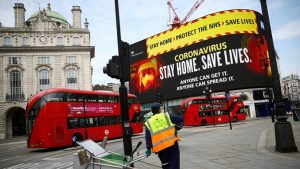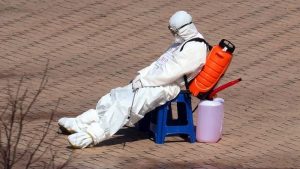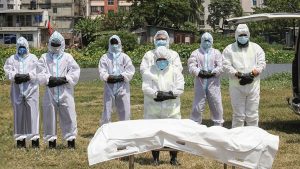16-06-2020
By SJA Jafri + Bureau Report + Agencies + Int’l Monitoring Desk
 LONDON/ PARIS/ NEW YORK/ BEIJING/ ISLAMABAD/ WELLINGTON: More than 8 million people have been confirmed to have the coronavirus around the world. More than 3.8 million have recovered, while at least 435,662 have died, according to data compiled by Johns Hopkins University. The US, Brazil and the UK have reported the most deaths.
LONDON/ PARIS/ NEW YORK/ BEIJING/ ISLAMABAD/ WELLINGTON: More than 8 million people have been confirmed to have the coronavirus around the world. More than 3.8 million have recovered, while at least 435,662 have died, according to data compiled by Johns Hopkins University. The US, Brazil and the UK have reported the most deaths.
Beijing officials have described the coronavirus outbreak centred on the Xinfadi wholesale food market as “very grim” as more parts of the city are sealed off.
WHO head Tedros Adhanom Ghebreysus has warned that countries need to “stay alert to the possibility of resurgence” as new clusters of cases emerge in Beijing and more than 100,000 cases of coronavirus are reported across the world every day.
Here are the latest updates;
Under 20s almost half as susceptible to COVID-19
 People under 20 are almost half as susceptible to COVID-19 as people aged 20 or above, according to new research, and clinical symptoms of the pandemic disease appear in only about a fifth of infections in children and teens.
People under 20 are almost half as susceptible to COVID-19 as people aged 20 or above, according to new research, and clinical symptoms of the pandemic disease appear in only about a fifth of infections in children and teens.
The modelling study – published in the journal Nature Medicine – using data from 32 locations China, Italy, Japan, Singapore, Canada and South Korea, found that by contrast, COVID-19 symptoms appear in 69 percent of infections in people aged 70 or older.
Indonesia to reopen schools in low-risk areas
Indonesia will reopen schools located in low-risk areas starting in July after months of closure due to coronavirus, the education ministry said.
Sri Wahyuningsih, a ministry official, said in a webinar that the reopening of schools will be carried out in phases depending on the level of education and the provisions of the health protocols.
“Middle and high schools will start to reopen in July, elementary schools in September, while kindergartens will be the last to reopen in November at the earliest,” said Wahyuningsih, adding only 6 percent of all schools in the country are located in low-risk areas.
Turkey makes masks compulsory in 42 provinces
 Turkey has made the wearing of face masks mandatory in five more provinces, following an uptick in COVID-19 cases.
Turkey has made the wearing of face masks mandatory in five more provinces, following an uptick in COVID-19 cases.
Health Minister Fahrettin Koca said on Twitter that the wearing of masks is now compulsory in 42 of Turkey’s 81 provinces.
In the remaining provinces, residents are required to wear masks on public transportation and in shops and malls, and are being advised to wear masks and keep to social distancing practices elsewhere.
Koca said: “We cannot struggle against the virus without masks.”
Hungary MPs vote to end virus emergency powers
Hungarian MPs have voted to revoke anti-coronavirus emergency powers that triggered international criticism and fears of a power grab by Prime Minister Viktor Orban.
Dominated by Orban’s ruling Fidesz party, parliament approved the lifting of a “state of danger” and related special powers to tackle the COVID-19 crisis.
The state of danger is expected to be formally lifted later on this week by the government.
Coronavirus a recipe for disaster for German potatoes
 German demand for potatoes and potato products has collapsed during the coronavirus crisis, with the vegetable being used as animal feed or for making biogas instead, an industry body said.
German demand for potatoes and potato products has collapsed during the coronavirus crisis, with the vegetable being used as animal feed or for making biogas instead, an industry body said.
There had been a “catastrophic reduction in sales” of frozen, chilled and dry potato products, the German Association of the Fruit, Vegetable and Potato Processing Industry (BOGK) said.
Germany is the biggest producer of potatoes in the European Union and a huge consumer.
More than 600,000 lose jobs in the UK
The number of people on British company payrolls fell by more than 600,000 in April and May as the coronavirus lockdown hit the labour market, and vacancies plunged by the most on record, official data showed.
The jobless rate unexpectedly held at 3.9 percent over the three months to April – despite a record slump in overall economic output during that period – as firms turned to the government’s job retention scheme to keep employees on their books.
 Meanwhile, the number of people claiming job-related benefits also increased by a monthly 23.3 percent in May to 2.8 million.
Meanwhile, the number of people claiming job-related benefits also increased by a monthly 23.3 percent in May to 2.8 million.
Latest coronavirus figures
Oman: 25,269 cases (745), 114 deaths (6)
Russia: 545,458 cases (8,248), 7,284 deaths (193)
Indonesia: 40,400 (1,106), 2,231 deaths (33)
Malaysia: 8,505 cases (11), 121 deaths (0)
Philippines: 26,781 cases (364), 1,103 deaths (5)
Germany’s coronavirus tracing app goes live
Germany sought to mobilise the public to download a new smartphone app that seeks to help break the chain of coronavirus infections, one of several such apps in Europe that governments hope will revive travel and tourism.
The new Covid-Warn-App, which became available for download for Apple and Android phones overnight, uses Bluetooth short-range radio to monitor close contacts between people and issue a warning should one of them test positive.
“Everyone who downloads the app, and everyone who encourages friends to do so, is making a difference,” Health Minister Jens Spahn told ZDF public television ahead of a launch event in Berlin.
Singapore to start human trials of vaccine in August
 Singapore scientists testing a COVID-19 vaccine from US firm Arcturus Therapeutics plan to start human trials in August after promising initial responses in mice.
Singapore scientists testing a COVID-19 vaccine from US firm Arcturus Therapeutics plan to start human trials in August after promising initial responses in mice.
More than 100 vaccines are being developed globally, including several already in human trials from the likes of AstraZeneca and Pfizer, to try and control a disease that has infected more than 8 million people and killed over 430,000 worldwide.
The vaccine being evaluated by Singapore’s Duke-NUS Medical School works on the relatively-untested Messenger RNA (mRNA) technology, which instructs human cells to make specific coronavirus proteins that produce an immune response.
Hong Kong to allow gatherings of up to 50 people
Hong Kong will let groups of up to 50 people meet from Friday, easing an earlier limit of eight people, after reporting only a small number of coronavirus cases in recent weeks, Health Secretary Sophia Chan said.
The Asian financial hub has reported a total of 1,113 cases and four deaths since the outbreak began in late January.
Tokyo Olympic board member would support another delay
An executive board member of the Tokyo Olympic organising committee says another delay should be sought if the games can’t be held next year.
The Tokyo Olympics were to be held this year but were postponed because of the coronavirus pandemic. The suggestion comes from Haruyuki Takahashi in an interview published in the Japanese sports newspaper Nikkan Sports.
“The main priority is to make a united effort to hold them (Olympics) in the summer of 2021,” Takahashi said. He added if that is not possible we should start action once again to get another delay.
Ukraine president’s wife hospitalised with coronavirus
 The wife of Ukraine’s President, Olena Zelenska, was hospitalised after contracting coronavirus and her condition was stable, the presidential office said.
The wife of Ukraine’s President, Olena Zelenska, was hospitalised after contracting coronavirus and her condition was stable, the presidential office said.
Zelenska said last week she had tested positive for coronavirus, while her husband Volodymyr Zelenskiy and their two children had tested negative.
We are keeping a list of celebrities, athletes and politicians who have been infected.
Patients filling beds in India’s largest cities
India has recorded another 10,000-plus coronavirus infections as patients swamp health services in its largest cities.
The Health Ministry also reported a 24-hour increase of 380 deaths due to COVID-19, driving the death toll to 9,900.
The 10,667 new cases raise the nation’s total to 343,091, fourth-highest in the world behind the US, Brazil and Russia.
Maharashtra, the western state that is home to Mumbai, India’s financial and entertainment capital, continues to have the highest state toll. Mumbai, Chennai and the capital New Delhi are seeing rising infections swamp their health services.
Ilhan Omar’s father dies from coronavirus complications
Father of Somalia-born US Representative Ilhan Omar has died of complications from the novel coronavirus, local media reported.
“It is with tremendous sadness and pain to say goodbye to my father,” the Minnesota congresswoman tweeted late on Monday. “No words can describe what he meant to me and all who knew and loved him.”
Omar and her father Nur Mohamed came to the United States as refugees in 1995 from Somalia during the country’s civil war and eventually settled in Minneapolis, according to Politico.
Privacy fears over COVID-19 apps by Bahrain, Kuwait, Norway
Amnesty International has raised privacy and security concerns over “invasive” contact-tracing apps rolled out by Bahrain, Kuwait and Norway to fight the coronavirus pandemic.
The UK-based rights group said an investigation into COVID-19 apps being used by 11 countries had rated Bahrain’s “BeAware Bahrain”, Kuwait’s “Shlonik” and Norway’s “Smittestopp” as among the “most dangerous” for human rights, putting hundreds of thousands of people at risk.
Amnesty found that all three were actively carrying out live or near-live tracking of users’ locations by frequently uploading GPS coordinates to a central server.
Hello, this is Saba Aziz in Doha, taking over the live blog from my colleague Kate Mayberry.
I’m handing the blog to my colleagues in Doha shortly. Before I go, a quick round-up of what’s been happening over the past few hours.
The situation in Beijing is proving worrisome with city officials stepping up containment measures and other parts of China imposing quarantines on those travelling from the capital. Pakistan is also promising tougher measures as it tries to get a grip on the outbreak. Elsewhere, New Zealand has confirmed two new cases. The disease wasn’t acquired locally, however. It was found in two people who had recently returned from the UK.
Pakistan identifies 20 cities at coronavirus risk
Pakistan’s government says it has identified 20 cities that are most at risk from the rapid spread of the coronavirus and will be implementing strict lockdowns in certain neighbourhoods.
Al Jazeera’s Asad Hashim says the authorities are calling it a “smart” lockdown approach.
On Monday, Pakistan endured the deadliest day of the pandemic so far, recording 110 deaths, taking the country’s tally to 2,897 people killed by COVID-19 since late February. Cases rose by 4,443 to 148,921.
Chairing a meeting on coronavirus response, Prime Minister Imran Khan directed officials to investigate increasing reports of hospitals in major cities hitting their capacity and not being able to admit more coronavirus patients, especially those requiring critical care.
US airlines threaten ban for passengers who refuse to wear masks
Major US airlines will provide masks to passengers who do not have them, and have warned passengers who refuse to wear masks that they could be banned from flights.
The airlines will clearly inform passengers about their individual policies on face coverings before flying, followed by an announcement with specific details onboard, Airlines for America said in a statement.
Each carrier will decide the appropriate consequences for passengers who fail to comply, up to and including being put on that airline’s no-fly list.
Beijing officials say Xinfadi market outbreak ‘very grim’
City officials in Beijing have described the coronavirus outbreak centred on the Xinfadi market as “very grim” according to the Global Times.
The Times says nine of 11 districts in Beijing have reported confirmed cases, with the area of Fengtai, which is around the market, the worst affected.
Beijing expects to complete a citywide inspection and sanitation campaign targeting wholesale and vegetable markets, as well as restaurants and canteens on Wednesday. All vendors and business operators will have to undergo nucleic acid tests.
Shanghai imposes quarantine for some domestic visitors
Shanghai says it will impose a 14-day quarantine on all people arriving in the city from medium to high-risk COVID-19 areas elsewhere in China.
Wu Jinglei, the director of Shanghai’s health commission, says those arriving from high-risk places will have to complete a centralised quarantine and will undergo nucleic acid testing twice.
Beijing imposes curbs on more districts after outbreak linked to market
Beijing is imposing coronavirus restrictions on more districts after an outbreak linked to the capital’s wholesale food market. There are now 22 districts deemed “medium-risk” with local authorities setting up checkpoints, stepping up social distancing and closing schools.
City officials reported 27 new cases for June 15, taking the total for the latest spike to 106, as the authorities track down close contacts of those known to have the virus.
Other cities in China have also responded to the outbreak, with some imposing quarantines or stepping up their own preventive measures.
China’s president to convene COVID-19 ‘solidarity’ summit with Africa
China’s President Xi Jinping is to hold a “solidarity” summit with Africa over the coronavirus pandemic.
Xi will deliver a keynote speech at the summit on June 17, according to Chinese state media.
New Zealand reports two new cases in travellers returning from UK
New Zealand has confirmed two new cases of coronavirus, both connected with travel to the UK and to each other.
New Zealand lifted all coronavirus restrictions last week, but is keeping its borders to closed to everyone except citizens and special cases.
More than 8 million coronavirus cases recorded worldwide
Some 8,005,294 cases of coronavirus have now been confirmed around the world, according to data from Johns Hopkins University. The actual figure is likely to be much higher because countries often have different criteria for testing, and milder and asymptomatic cases may go undetected.
These are the five countries with the most cases;
US – 2,111,622
Brazil – 888,271
Russia – 536,484
India – 332, 424
United Kingdom – 298,315
These are the five countries that have recorded the most deaths;
US – 116,114
Brazil – 43,959
United Kingdom – 41,821
Italy – 34,371
France – 29,439
Coronavirus more likely to kill those with chronic conditions: CDC
A new report from the Centers for Disease Control and Prevention has found people with chronic illnesses including heart disease and diabetes are six times more likely to be admitted to hospital, and 12 times more likely to die than COVID-19 patients with no underlying conditions.
The CDC based its analysis on 1.32 million confirmed cases of coronavirus received between January 22 and the end of May.
Although information on underlying conditions was available for only 22 percent of those patients, the CDC found that of those, 32 percent had a heart-related illness, 30 percent had diabetes and 18 percent had chronic lung conditions, including asthma.
The CDC said age remained a major risk. The percentage of intensive care admission was highest among people aged at least 60 and over with underlying conditions. People over the age of 80 were the most likely to die, even if they did not have a chronic illness.
 Pressmediaofindia
Pressmediaofindia




